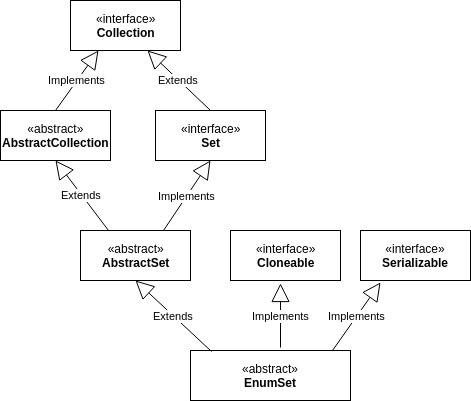Enum
- 여러 상수를 선언할 때 편리하게 선언할 수 있는 방법
- 열거형 상수는
==를 사용하여 비교할 수 있다.
enum 열거형이름 { 상수명1, 상수명2, ... }장점
- 데이터의 그룹화 및 관리에 용이하다.
- Lambda를 사용하면 활용성을 극대화 할 수 있다.
import java.util.function.BiFunction;
public enum Operator {
PLUS("더하기", (a, b) -> (a + b)),
MINUS("빼기", (a, b) -> (a - b)),
MULTIPLY("곱하기", (a, b) -> (a * b)),
DIVIDE("나누기", (a, b) -> (a / b));
private final String name;
private final BiFunction<Double, Double, Double> biFunction;
Operator(String name, BiFunction<Double, Double, Double> biFunction) {
this.name = name;
this.biFunction = biFunction;
}
public Double calculate(double a, double b) {
return this.biFunction.apply(a,b);
}
}Singleton
Serializable 인터페이스를 구현하고 있기 때문에 전통적인 방식에서 deserialization 시 새로운 인스턴스가 생성되지 않는지 보장해야했던 것과 달리 JVM에 의해 싱글톤으로 관리되는 것이 보장된다.
Enum에서 선언한 상수들은 클래스가 로딩될 때 하나의 인스턴스로 생성되어 싱글톤 형태로 관리된다.
- javap 명령어(
javap -c 클래스이름)를 통해 enum 클래스파일을 원시 코드로 디스어셈블해보면 enum의 각 상수가 정의한 enum 타입의 객체를 생성하는 것을 확인할 수 있다. - 각 상수가 싱글톤으로 생성되기 때문에 enum의 멤버 변수는 thread-safe하다. → double-checked locking을 안해도 된다.
- double-checked locking: https://www.baeldung.com/java-singleton-double-checked-locking
java.lang.Enum
-
모든 열거형의 조상 클래스
메서드 설명 T[] values() 해당 enum 타입에 정의된 상수 배열을 반환한다. Class getDeclaringClass() 열거형의 Class객체를 반환한다. String name() 열거형 상수의 이름을 문자열로 반환한다. int ordinal() 열거형 상수가 정의된 순서(0부터 시작) 을 정수로 반환한다. T valueOf(Class enumType, String name) 지정된 열거형에서 name과 일치하는 열거형 상수를 반환한다. -
모든 열거형은 내부적으로 java.lang.Enum 클래스를 상속받고 있기 때문에 다른 클래스를 상속받을 수 없다.
public abstract class Enum<E extends Enum<E>>
extends Object
implements Comparable<E>, SerializableEnumSet
- 열거형 타입과 함께 사용되도록 특화된 Set 구현체
- Set 인터페이스를 구현하고, AbstactSet을 상속한다.

- 같은 enum 타입에 속한 값들만 포함할 수 있다.
- null 값을 추가할 수 없으며, null을 추가하려고 하면 NullPointerException이 발생한다.
- enum에 선언된 순서대로 요소가 저장된다.
- fail-safe iterator를 사용하여 컬렉션이 순회 중에 수정되도라도 ConcurrentModificationException이 발생하지 않는다.
- fail-fast는 동작 중 오류가 발생하면 바로 오류를 알리고 작업을 중단닿는 반면, fail-safe는 동작 중 오류가 발생해도 작업을 계속 진행한다.
- ArrayList, HashMap 등 java.util 패키지에 속한 컬렉션들의 기본 iterator는 fail-fast iterator를 사용한다.
메서드
| Modifier and Type | Method | Description |
|---|---|---|
static <E extends Enum<E>>EnumSet<E> | allOf(Class<E> elementType) | Creates an enum set containing all of the elements in the specified element type. |
EnumSet<E> | clone() | Returns a copy of this set. |
static <E extends Enum<E>>EnumSet<E> | complementOf(EnumSet<E> s) | Creates an enum set with the same element type as the specified enum set, initially containing all the elements of this type that are not contained in the specified set. |
static <E extends Enum<E>>EnumSet<E> | copyOf(Collection<E> c) | Creates an enum set initialized from the specified collection. |
static <E extends Enum<E>>EnumSet<E> | copyOf(EnumSet<E> s) | Creates an enum set with the same element type as the specified enum set, initially containing the same elements (if any). |
static <E extends Enum<E>>EnumSet<E> | noneOf(Class<E> elementType) | Creates an empty enum set with the specified element type. |
static <E extends Enum<E>>EnumSet<E> | of(E e) | Creates an enum set initially containing the specified element. |
static <E extends Enum<E>>EnumSet<E> | of(E e1, E e2) | Creates an enum set initially containing the specified elements. |
static <E extends Enum<E>>EnumSet<E> | of(E first, E... rest) | Creates an enum set initially containing the specified elements. |
static <E extends Enum<E>>EnumSet<E> | of(E e1, E e2, E e3) | Creates an enum set initially containing the specified elements. |
static <E extends Enum<E>>EnumSet<E> | of(E e1, E e2, E e3, E e4) | Creates an enum set initially containing the specified elements. |
static <E extends Enum<E>>EnumSet<E> | of(E e1, E e2, E e3, E e4, E e5) | Creates an enum set initially containing the specified elements. |
static <E extends Enum<E>>EnumSet<E> | range(E from, E to) | Creates an enum set initially containing all of the elements in the range defined by the two specified endpoints. |
예제 (from Baeldung)
- Color 열거형의 모든 요소를 포함한 EnumSet 생성
EnumSet.allOf(Color.class);- Color 열거형의 비어있는 컬렉션 생성
EnumSet.noneOf(Color.class);- 범위 내 EnumSet 생성
EnumSet.range(Color.YELLOW, Color.BLUE);
[YELLOW, GREEN, BLUE]- 특정 요소를 제외한 EnumSet 생성
EnumSet.complementOf(EnumSet.of(Color.BLACK, Color.WHITE));
[RED, YELLOW, GREEN, BLUE]- 복사
EnumSet.copyOf(EnumSet.of(Color.BLACK, Color.WHITE));참고
EnumUtils 클래스
parse, don't validate
public enum Status {
OPEN(true),
CLOSE(false);
public static Status parse(String statusStr) {
return Status.valueOf(statusStr.toUpperCase());
}
public Boolean getBoolean() { return this.bool }
}Source
- https://docs.oracle.com/en/java/javase/11/docs/api/java.base/java/lang/Enum.html
- 자바의 정석 Chapter 12
- https://wisdom-and-record.tistory.com/52
- https://velog.io/@kyle/%EC%9E%90%EB%B0%94-Enum-%EA%B8%B0%EB%B3%B8-%EB%B0%8F-%ED%99%9C%EC%9A%A9
- https://www.baeldung.com/a-guide-to-java-enums
- https://lng1982.tistory.com/129
- https://www.geeksforgeeks.org/advantages-and-disadvantages-of-using-enum-as-singleton-in-java/
- https://www.baeldung.com/java-enumset
- https://www.baeldung.com/java-fail-safe-vs-fail-fast-iterator
- https://docs.oracle.com/en/java/javase/11/docs/api/java.base/java/util/EnumSet.html
